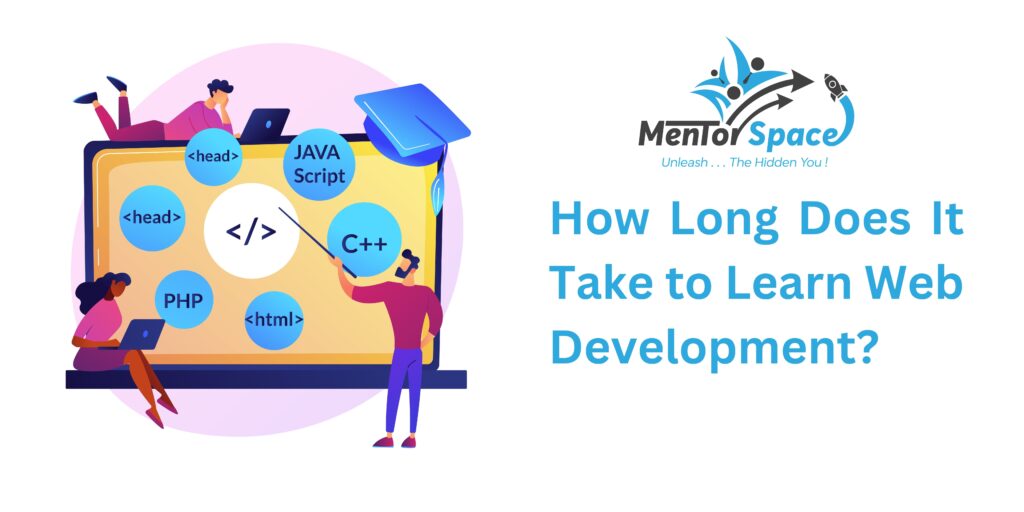Introduction:
In today’s digital era, web development has become an in-demand skill that offers numerous career opportunities. Whether you’re looking to become a professional web developer or simply want to enhance your coding skills, one common question arises: “How long does it take to learn web development?” The answer to this question depends on various factors, including your dedication, prior experience, and the depth of knowledge you wish to acquire. In this blog post, we will explore the key aspects of web development and provide a general roadmap to help you estimate the time it may take to become proficient in this field.
Defining Web Development:
Web development involves creating and managing websites and web applications, covering various skills like front-end development, back-end development, and database management. To become proficient in web development, you must learn a mix of programming languages, frameworks, and tools. It’s a multifaceted field that requires a comprehensive skill set to build functional and visually appealing websites.
The Fundamentals:
Before diving into the specifics of web development, it’s essential to establish a strong foundation. Familiarize yourself with HTML (Hypertext Markup Language) and CSS (Cascading Style Sheets) as they form the backbone of any web page. These languages define the structure, layout, and visual presentation of websites. This initial stage typically takes a few weeks of dedicated learning and practice.
Front-End Development:
Front-end development focuses on the user interface and user experience aspects of a website. It involves using programming languages such as JavaScript, along with frameworks like React, Angular, or Vue.js. Learning front-end development may take several months, depending on your prior coding experience. Start by understanding JavaScript fundamentals and gradually progress to frameworks and libraries.
Back-End Development:
Back-end development handles the server-side logic and database management of a website. Key technologies in this domain include Node.js, Python, Ruby on Rails, or PHP, combined with frameworks like Express, Django, or Laravel. Becoming proficient in back-end development usually takes a similar amount of time as front-end development.
Databases and Storage:
To handle dynamic web applications effectively, familiarity with databases is essential. Gain knowledge about database management systems like MySQL, PostgreSQL, or MongoDB. The duration required to comprehend designing, querying, and interacting with databases can vary from a few weeks to several months, depending on the intricacy of the concepts you aim to master.
Additional Skills:
To enhance your web development skills, consider exploring additional technologies. These may include version control systems (e.g., Git), responsive design principles, web security practices, and web performance optimization techniques. Mastery of these skills can significantly improve your overall proficiency as a web developer.
Ongoing Learning and Practice:
In the realm of web development, constant evolution is the norm. Keep yourself abreast of the latest trends, tools, and frameworks. Participation in personal projects and open-source contributions is invaluable for acquiring practical experience. Remember, learning is a continuous process, and consistent practice is essential for staying current in this dynamic industry.
For more about Web development: Wiki
Conclusion:
The time it takes to learn web development varies from person to person. While some individuals may become proficient in a few months, others may require a year or more to reach a professional level. The key factors that influence the learning timeline include your commitment, prior programming experience, the depth of knowledge you wish to acquire, and the amount of time you can dedicate to learning. Remember, becoming a proficient web developer is a journey, and it’s essential to enjoy the process while staying motivated. With perseverance and dedication, you can acquire the necessary skills to embark on a successful career in web development.
FAQs: About Learning Web Development
FAQ 2: Can I learn web development without any prior coding experience?
A: Yes, you can learn web development without prior coding experience. There are beginner-friendly resources, online courses, and coding bootcamps available that cater to beginners and gradually introduce you to the world of web development.
FAQ 3: What are the best resources for learning web development?
A: There are numerous resources available for learning web development. Some popular options include online platforms like FreeCodeCamp, Udemy, Codecademy, and Mozilla Developer Network (MDN). These platforms offer structured courses, tutorials, and documentation to help you learn web development at your own pace.
FAQ 4: Can I learn web development on my own, or do I need formal education?
A: You can certainly learn web development on your own through self-study and online resources. Many successful web developers are self-taught. However, formal education, such as a computer science degree or coding bootcamp, can provide structured learning and a supportive community.
FAQ 5: How can I stay updated with the latest trends in web development?
A: To stay updated with the latest trends in web development, you can follow reputable websites and blogs, subscribe to industry newsletters, join web development communities, and attend conferences and meetups. Engaging with the web development community is a great way to keep up with new technologies and best practices.
FAQ 6: Are coding bootcamps worth considering for learning web development?
A: Coding bootcamps can be a valuable option for learning web development. Bootcamps offer intensive, immersive programs that focus on practical skills and often provide career services and networking opportunities. However, it's essential to research and choose a reputable bootcamp that aligns with your goals and learning style.



